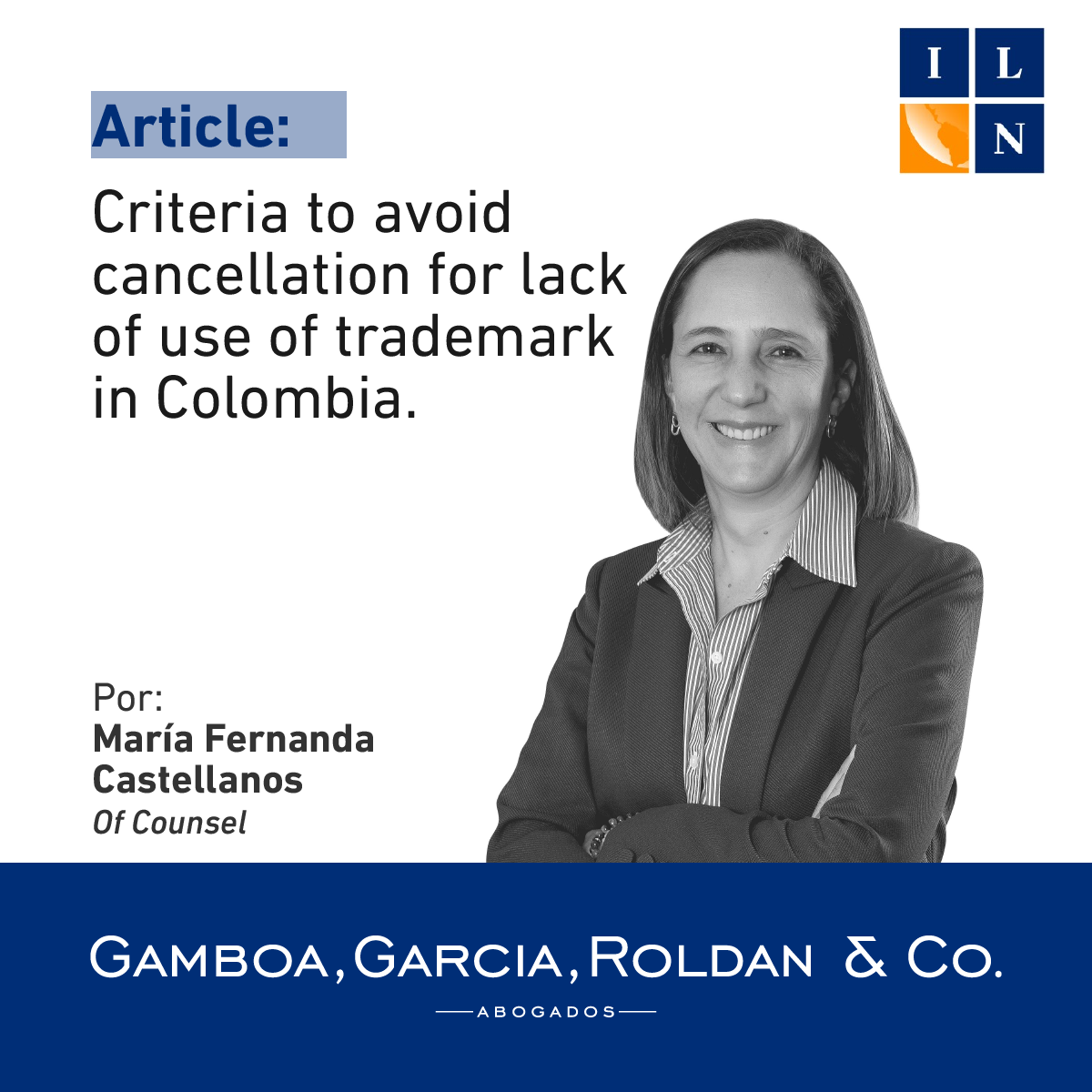CRITERIA TO AVOID CANCELLATION FOR LACK OF USE OF A TRADEMARK IN COLOMBIA
Exclusive rights over a trademark in Colombia arise from registration. Also, when holding a trademark registration in Colombia, the obligation arises for its owner to use the trademark in commerce, beginning three (3) years from the date when registration was granted.
This means that a trademark registration in Colombia may be canceled by the Trademark Office, if the trademark has not been effectively and publicly used, to identify in commerce, goods or services covered by the registration.
A cancellation action is a formal request, posed by any third interested party, which commences by filing a cancellation petition with the Trademark Office, upon payment of the applicable official fee.
If the cancellation petition is granted by the Trademark Office, the party who requested cancellation has a preferential right to file, within three (3) months following the decision that canceled the initial registration, a new application to register the same trademark that was canceled.
Once a cancellation action has been admitted to proceeding, the owner of the trademark that has been questioned for lack of use will be granted a sixty (60) day term to provide evidence of sufficient, public and continuous use of the trademark in the market, in Colombia or at least one of the countries that are members to the Andean Community, to identify all or some of the products or services covered by the registration.
The evidence provided in defense of the cancellation must show that the trademark has been used in the way that it was registered; this means that the trademark used in the market to identify products or services, corresponds to the one registered, and only variations in non-essential elements would be admitted to support a valid use.
Following is a summary of elements that the Colombian Trademark Office and the case law have identified as relevant to be considered when reviewing if a trademark registration is subject to cancellation:
– The cancellation of trademarks has the ultimate purpose of excluding, from the trademark register, any distinctive signs that have not been used by its owner, and which may be of interest to third parties.
– The concept of sufficient use of a trademark, implies both a qualitative and quantitative analysis of the evidence, to confirm if the evidentiary elements provided by the owner show that products or services have been made available in commerce under the trademark, in the quantities and in the form that is expected for the particular type of products or services.
– To avoid cancellation the trademark must have been used by the owner or by a third authorized party. Said use must have happened within the relevant period –three (3) years before the date when the cancellation request was filed– and must be referred to transactions for amounts that are consistent with the type of products or services that are covered by the registration.
– The evidence of use may show that the trademark has been used in Colombia, or in at least one of the member countries of the Andean Community, namely Perú, Ecuador and Bolivia.
– Also, any evidence that shows use of the trademark in products that are destined to be exported from the member countries, may prevent cancellation, if the quantities are deemed to be sufficient.
– Evidence consisting in advertising materials is not deemed to be sufficient to prevent cancellation by itself, since it only shows an activity that may happen before the actual commercialization of products or services, but does not show that the products bearing the trademark have been available to consumers in the market.
– On a case-by-case basis, the Trademark Office will determine whether the use that is evidenced in the proceeding shows that the transactions reflected in the documents correspond to the normal commercialization of the relevant products. For example, if the trademark is registered to identify massive consumption products, the quantity of products sold must reflect the expected number of transactions over these types of products, during the relevant term.
– Any documents supplied as evidence of use, such as copies of invoices, accounting certificates or affidavits, must depict or make express reference to the trademark and the relevant products, so that the Trademark Office may verify that the information contained therein shows, with a high level of certainty, that the trademark has been used in commerce.
- The Trademark Office may decide to partially cancel the registration. In this case, the decision to cancel will declare that the registration remains in force to cover those products whose use has been evidenced by the trademark owner, thus eliminating from the scope of the registration all of the other products that were not covered by the evidence submitted to the proceeding.
A decision to cancel a trademark may be appealed, and the final decision from the Trademark Office may be challenged before the administrative courts.
At Gamboa, García, Roldán & Co. we are ready to assist with the defense of your trademark registrations against cancellation actions filed by third parties. Also, we are ready to structure effective strategies to minimize the risk of cancellation, and to update your trademark portfolio so that the legal protection of your brands is in line with how they are currently used in the market, under your business plans and priorities.

